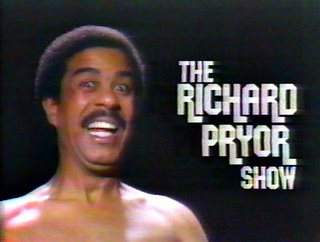R.I.P. Richard Pryor - A Moment of Silence
 Richard Pryor, whose blunt, blue and brilliant comedic confrontations confidently tackled what many stand-up comic's before him deemed too shocking—and thus off-limits—to broach, died this morning. He was 65. Pryor suffered a heart attack at his home in San Fernando Valley section of Los Angeles early Saturday morning. He was pronounced dead at a nearby hospital.
Richard Pryor, whose blunt, blue and brilliant comedic confrontations confidently tackled what many stand-up comic's before him deemed too shocking—and thus off-limits—to broach, died this morning. He was 65. Pryor suffered a heart attack at his home in San Fernando Valley section of Los Angeles early Saturday morning. He was pronounced dead at a nearby hospital.The comedian's tremendous body of work, a political movement in itself, was steeped in race, class, social commentary, and encompassed the stage, screen, records and television. He won five Grammys, an Emmy and was an Academy Award nominee for his role in Lady Sings the Blues in 1972.
Pryor worked as an actor and writer as well as a stand-up comic throughout the '70s and into the '80s. He won Grammys for his groundbreaking, socially irreverent, concert albums Bicentennial Nigger and That Nigger's Crazy. And in 1973 he walked away with a writing Emmy for a Lily Tomlin television special.
Pryor starred in more than 30 feature films—including the semiautobiographical directing turn in Jo Jo Dancer, Your Life is Calling, The Toy and Superman III. He also co-starred with comedian Gene Wilder in the highly popular buddy films Silver Streak and Stir Crazy.
It was however his concert films—particularly Richard Pryor—Live in Concert (1979)—which many critics consider to be his best work.
By 1975, Pryor appeared on Saturday Night Live, at the time considered to be among TV's most irreverent shows. But it wasn't until Pryor went on the air that SNL instituted for the first time a five-second delay to ensure that Pryor did not ruffle the NBC censors. (Pryor also had his own short-lived series, The Richard Pryor Show, which was axed after only four episodes in 1977, the victim of head office scrutiny and low ratings.
n later years, Pryor's life was a blur of bad choices and reckless acts. Scarred by drugs, violence, quadruple bypass surgery, broken marriages and estranged children, Pryor, submerged in personal chaos, tried to take his own life.
The initial reports of June 9, 1980 were that the comedian accidentally set himself on fire while freebasing cocaine. Pryor finally revealed the truth in his autobiography Pryor Convictions and Other Life Sentences (Pantheon, 1995 and co-written with Todd Gold): "After freebasing without interruption for several days in a row, I wasn't able to discern one from the next . . . Imagining relief was nearby, I reached for the cognac bottle on the table in front of me and poured it all over me. Real natural. Methodical . . . I picked up my lighter . . . I was engulfed in flame. I was in a place that wasn't heaven or earth. I must've gone into shock because I didn't feel anything."
The freebasing incident, like many of Pryor's more dramatic mishaps, turned up as encore-worthy centerpieces of his stage routines. Among them, the much talked about New Year's morning in '78 when he repeatedly fired a .357 magnum revolver into his then wife's car. In incident after incident, the public repeatedly walked along side him, standing in full view of the wreckage, marveling at how many lives this mercurial man appeared to have.




0 Comments:
Post a Comment
<< Home